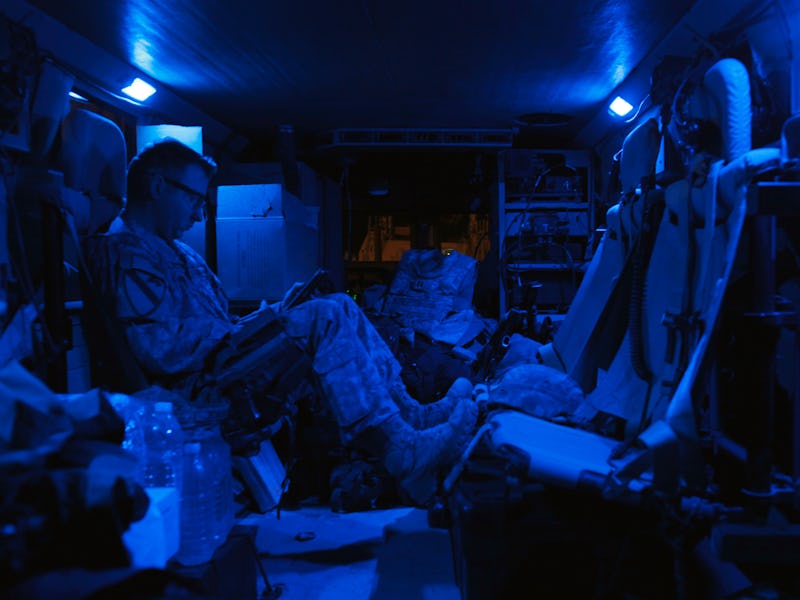The Military's Reading Lists Are the Best Cyberconflict Curriculum
Here's what you need to read to understand the future of international conflict.

The battlefield has expanded. Nation states now employ hackers to protect and capture information. This is the new ground conflict and the new permanent war. It is also, for most people not embedded in cybersecurity communities, utterly baffling. This is why the Defense Department demands soldiers read books about surveillance, IT infrastructure, and infrastructure preparedness in order to prepare themselves intellectually for any and all contingencies.
The reading lists created for the many branches of the U.S. military are all different, but cybersecurity has become one of the most prominent themes — behind only valor. While other books focus on the history of warfare, tactical considerations, and other more conventional subjects, investigations into the future of conflict prepare soldiers for a battle that has not yet been joined and help them understand the new nature of conflict.
Here are the books culled from the DoD lists that can help you do the same.
Cyber War: The Next Threat to National Security and What to Do About It
Homeland Security Watch recommends Cyber War: The Next Threat to National Security and What to Do About It by counter-terrorism expert Richard Clarke and Robert Knake. The book explores how the U.S. government has led advances in cyberwar but is still woefully underprepared when it comes to attacks from state-sponsored actors, hackers, and others.
Future Crimes: Everything Is Connected, Everyone Is Vulnerable, and What We Can Do About It
The USSOCOM Commander’s Reading List includes Future Crimes: Everything Is Connected, Everyone Is Vulnerable, and What We Can Do About It by Marc Goodman. Future Crimes is all about how “criminals, corporations, and even countries are using new and emerging technologies” like the Internet of Things and 3D-printers to target individuals and governments alike in novel ways.
Cybersecurity and Cyberwar: What Everyone Needs to Know
P.W. Singer (who wrote another title on this subject) and Allan Friedman penned the comprehensive guide to digital conflicts with Cybersecurity and Cyberwar: What Everyone Needs to Know. The book, recommended in the U.S. Army Chief of Staff’s Reading List, is meant to be an easily accessible introduction to many of the concepts discussed in further detail by the other books on this list.
Lights Out: A Cyberattack, A Nation Unprepared, Surviving the Aftermath
Is the United States ready for a cyberattack? That’s the question pondered by Ted Koppel in Lights Out: A Cyberattack, A Nation Unprepared, Surviving the Aftermath, which was recommended by the Center for Homeland Defense and Security. The book is all about how the U.S. electric grid could be crippled by hackers, and how tens of millions of people might respond when they go without power for prolonged periods of time.
@War: The Rise of the Military-Internet Complex
@War: The Rise of the Military-Internet Complex by Daily Beast intelligence reporter Shane Harris explores how the U.S. government, from the CIA to the Department of Defense, view cyberspace alongside land, sea, air, and space as the “fifth domain” of warfare. The book was included on the USSOCOM Commander’s Reading List.
7 Deadly Scenarios: A Military Futurist Explores the Changing Face of War in the 21st Century
Included on the U.S. Army War College Library’s suggested reading list, military consultant Andrew Krepinevich’s 7 Deadly Scenarios: A Military Futurist Explores the Changing Face of War in the 21st Century focuses on the future of warfare. How will people respond to black-market nukes or a massive cyberattack? That’s what Krepinevich tries to figure out in this exploration of modern wars.
Wired for War: The Robotics Revolution and Conflict in the 21st Century
Finally, Cybersecurity and Cyberwarfare co-author P.W. Singer also wrote the U.S. Army Chief of Staff’s Reading List approved Wired for War: The Robotics Revolution and Conflict in the 21st Century. This book seeks to answer a deceptively simple question: What happens when science fiction becomes battlefield reality? Read it to find out.